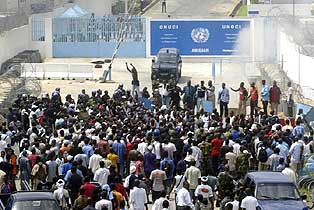
Thu 19 Jan 2006
UN troops look on from their base in Abidjan as supporters of President Gbagbo burn tyres outside the main gates.Picture: Kambou Sia/ AFP / Getty Images
Ivory Coast on brink of a new war
PAULINE BAX AND PETER MURPHY IN ABIDJAN
UNITED Nations peacekeepers fought off armed attackers besieging their compound in Ivory Coast yesterday, as the country appeared to be heading for a fresh outbreak of civil war.
At least four protesters were killed during the assault on the base at Guiglo, in the west of the country, and the UN later evacuated all its staff from that area.
In the capital, Abidjan, the main UN headquarters in the country also came under attack, as gangs of pro-government youths blocked streets and took over television studios, from where they broadcast demands for UN and French peacekeeping troops to leave.
Olusegun Obasanjo, the Nigerian president and a key regional mediator, was flying to the country yesterday for emergency talks with his counterpart.
Ivory Coast was divided in two, between a government-controlled south and a rebel-held north, after a civil war in 2002. The latest protests were orchestrated by government supporters after foreign mediators called for an end to the mandate of the national parliament, which is dominated by allies of the president, Laurent Gbagbo.
UN bases and vehicles have been among the demonstrators' main targets.
Margherita Amodeo, a UN spokeswoman, said: "The Guiglo camp was stormed at about 4am this morning. They were repelled by Bangladeshi soldiers. I know there are four from among the attackers [that were killed]."
An Ivorian army commander, who also confirmed the deaths but asked not to be named, said the peacekeepers had since evacuated from the towns of Guiglo and Duekoue, and this was later confirmed by the UN.
Residents reached by telephone in Guiglo, which is near the Liberian border, said rioters had been looting the offices of humanitarian organisations.
A doctor at the town's main hospital said two dead bodies with bullet wounds were lying in the morgue and there were reports of three further corpses in Guiglo's streets. Ten others had been treated for gunshot wounds, he said.
Peacekeepers inside the main UN headquarters in Abidjan fired in the air and launched tear-gas grenades at demonstrators for a second consecutive day yesterday, keeping about 1,000 protesters at bay.
A pro-Gbagbo student leader, Serge Koffi, appeared on state television, reading a statement saying that the broadcaster had been "liberated".
Demonstrators have, during past crises, seized the TV station, which is state-funded but run by a neutral party under peace accords.
A French army spokesman said the four protesters who died at Guiglo had tried to take weapons and had climbed on to armoured vehicles. He said 12 further demonstrators had been injured.
In Paris, the French army's chief of staff, General Henri Bentegeat, called for UN sanctions against Ivory Coast, saying that both sides appeared unwilling to resolve the three-year-old conflict.
The latest protests erupted on Monday after a UN-backed international mediation group recommended that the parliament's expired mandate should not be renewed.
Mr Gbagbo is leading a one-year government of national unity that has diminished his executive powers. The parliament, which is filled with his supporters, is viewed as his last bastion of power and the decision to dissolve it angered youth activists and the president's backers who sent their followers into the streets.
Businesses shut down across Abidjan, amid fears of a return to all-out violence.
There were no reports of any trouble in the north, where rebel leaders accused Mr Gbagbo of orchestrating the protests to undermine a new transitional government.
"It's an insurrection against the transitional government organised by Gbagbo and [his political party] to bring power back into their hands," said Sidiki Konate, a spokesman for the rebels.
Officials at the office of the president could not be reached for comment.
Kofi Annan, the UN secretary-general, has condemned the fresh violence, saying it threatens the nation's fragile peace.
Last year, Mr Gbagbo cancelled elections planned for October, blaming the rebels in the north. Afterwards, the UN and the African Union endorsed a one-year extension of his five-year mandate, despite fierce objections from rebels and opposition groups, and a new prime minister, Charles Konan Banny, was chosen by the warring sides to shepherd the country towards elections within a year.
He named a new 32-member national-unity government last month, composed of rebel, opposition party and ruling party ministers.
But Mr Gbagbo's ruling Ivorian Popular Front said on Tuesday that it was withdrawing from the peace process and would no longer co-operate with Mr Banny's government.
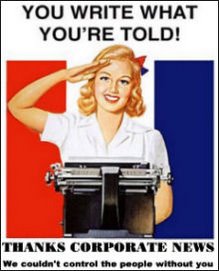

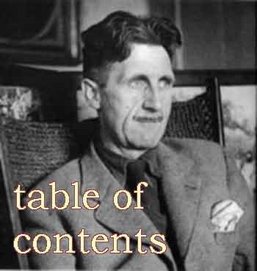
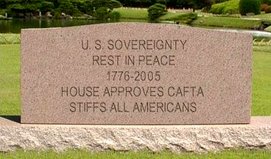


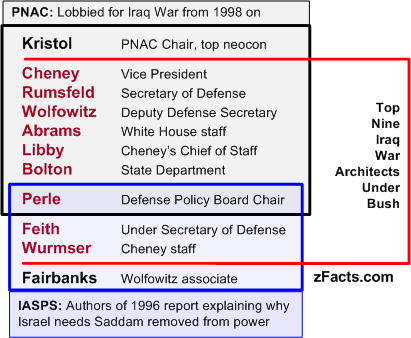
No comments:
Post a Comment